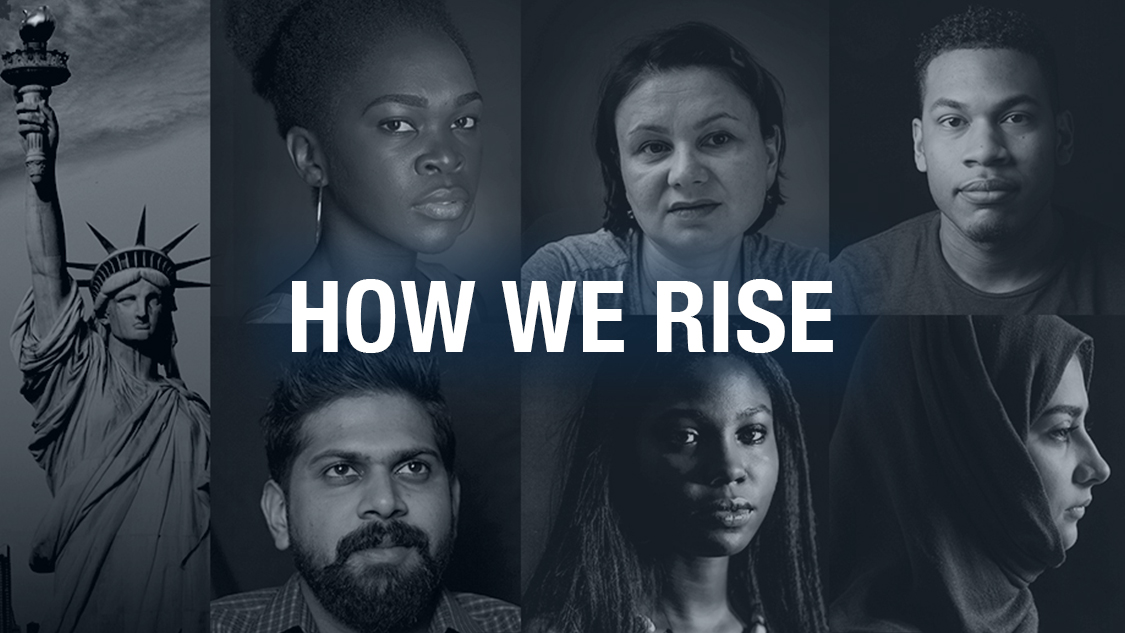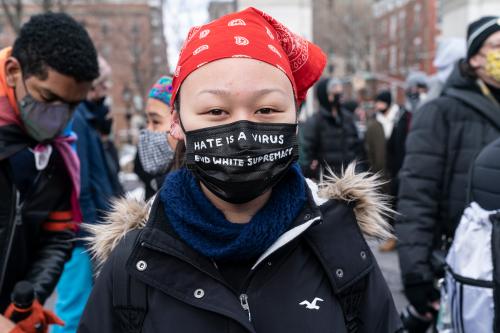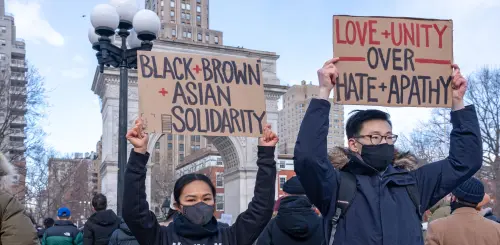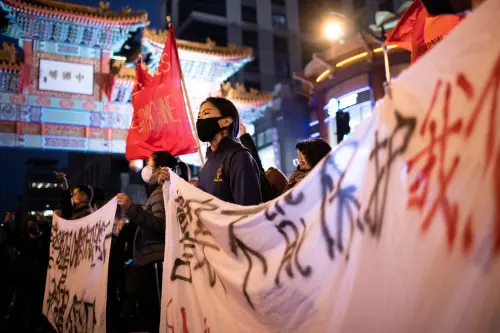Donald Trump is well known for his biased and insensitive remarks toward communities of color. Trump spent the final year of his presidency normalizing terms like the “China virus” and “kung flu,” despite members of the Congressional Asian Pacific American Caucus and World Health Organization warning that such rhetoric could amplify anti-Asian backlash and hate incidents. Congress’s response has mostly fallen along party lines: when the House passed a non-binding resolution in September 2020 to denounce anti-Asian racism, including terms like the “Wuhan virus,” 164 Republicans voted against it and only 14 voted in favor.
Rep. Grace Meng (D-NY) has described Joe Biden’s treatment of the Asian American and Pacific Islander (AAPI) community as “night and day.” During his first week in office, Biden issued a memorandum to condemn coronavirus-related racism, including language like “China virus” from political leaders. Yet, even after Biden assumed office, high-profile assaults on Asian Americans continued. On March 18, one day after the shooting of eight people—six of whom were Asian women—in Atlanta, Georgia, the House held its first hearing on anti-Asian discrimination in over three decades. Preliminary data from Stop AAPI Hate and the Center for the Study of Hate & Extremism suggests a rise in anti-Asian hate crimes since the start of the pandemic, although there are widespread challenges in collecting data and legally classifying incidents.
This week, Democratic leaders are set to take action on the COVID-19 Hate Crimes Act, a measure introduced by Meng and Sen. Marie Hirono (D-HI), in both the House and Senate. This bill would help state and local law enforcement establish online hate incident reporting (in multiple languages), appoint a Department of Justice official to expedite review of such reports, and release guidance on avoiding discriminatory language to describe COVID-19. Although President Biden has publicly endorsed the bill, so far no Republicans have co-sponsored it—with several citing concerns such as free speech or overregulation for their lack of support. Without at least some GOP support, the bill’s outcome is uncertain—should Republicans choose to actively block the bill, it cannot survive a potential Senate filibuster without at least 60 votes.
Despite this lack of endorsement of the COVID-19 Hate Crimes Act, it is still possible that Republicans might support hate crime protections in some form. Several GOP leaders denounced anti-Asian racism in the wake of the Atlanta shooting, and a few have indicated willingness to discuss amendments to Meng and Hirono’s legislation. Furthermore, the Jabara-Heyer NO HATE Act—which lacked Senate Republican co-sponsors in the 116th Congress—has been formally reintroduced this month with some bipartisan support. Meanwhile, Rep. Michelle Steel (R-CA) co-sponsored a resolution in February to condemn anti-Asian racism and Rep. Young Kim (R-CA) recently called for bipartisan support of the AAPI community.
While hate crime legislation faces partisan barriers in Congress, the White House recently announced several executive actions to respond to anti-Asian hate incidents. It will solicit recommendations from AAPI leaders to improve the White House Initiative on Asian Americans and Pacific Islanders and continue to fund research into anti-Asian racism through the National Science Foundation. It will also allocate $49.5 million to improve cultural and community-based services for domestic violence and sexual survivors, particularly AAPI individuals who may experience limited English proficiency or other barriers to assistance. In addition, it will establish a Department of Justice initiative to improve data transparency, language access, community resources, and coordination to fight hate crimes.
As Congress and the White House respond to anti-Asian attacks, including the mass shooting in Georgia, it is important to look at a larger context. Asian Americans are the fastest-growing racial demographic in the United States and are becoming an increasingly important electorate. In combination with demographic growth, preliminary analysis suggests that overall AAPI voter turnout increased from 51% in 2016 to 58% in 2020. This estimated seven percentage-point increase in voter turnout has been positively influenced by direct outreach from political campaigns and organizations. In Georgia, much of this outreach has been led by Black women; Stacey Abrams, for example, has attended AAPI political events and actively connected with the Asian American community for years.
For toss-up elections and battleground states—where the threshold between Democrats and Republicans is thin—outreach to the AAPI community can be especially vital for both parties. Last November, Joe Biden narrowly won Georgia by 11,779 votes, or a 0.23% margin. Meanwhile, preliminary estimates suggest that approximately 134,000 AAPI voters from Georgia cast a ballot in the presidential election, up from 73,000 in 2016. [i] And while Jon Ossoff and Raphael Warnock’s subsequent Senate run-off victories were the direct result of extraordinary turnout from Black voters in Georgia—as well as the organizing by Abrams and many others—the closeness of the races means that neither party can afford to ignore AAPI voters, which comprised about 2% of run-off voters. Other potential swing states with a relatively large AAPI electorate include Nevada and Virginia, and Asian American voters could continue to be influential during certain House elections in Texas and California as well.
Georgia’s new voting law, enacted March 25, has received criticism—and a reported Department of Justice investigation—due to its potential to disproportionately suppress voters in communities of color. For example, the law shortens the early-voting period and introduces tougher absentee voter ID requirements. This could serve to disenfranchise the AAPI community, which has seen an almost 300% increase in early and mail-in voting in swing states from the 2016 to the 2020 presidential election. Furthermore, the more complex voting requirements could present confusion and language barriers for people who speak English as a second language. In Georgia, approximately 80% of Asian Americans speak a language other than English at home.
As states like Texas, Florida, and Arizona consider similar voting legislation, it is possible that these Republican-trifecta governments are reacting to changing demographics within their electorates. But, as Rashawn Ray writes, neither party benefits from voter suppression. Both parties are better served by supporting policies that appeal to diverse constituencies, conducting outreach to communities of color early in the campaign cycle, and increasing access to the ballot box. And so, as members of Congress continue to respond to the Atlanta shooting and other anti-Asian verbal or physical attacks—and as they vote on the COVID-19 Hate Crimes Act—both parties could benefit from protecting the AAPI community not only as a matter of morality, but a matter of politics.
Editors note: this blog has been updated to reflect that the Jabara-Heyer NO HATE Act lacked Senate Republican co-sponsors in the 116th Congress.
Footnotes
[i] This estimate is based on TargetSmart’s analysis of early voting data. The Current Population Survey has not yet released voter demographic information for the 2020 presidential election.
The Brookings Institution is committed to quality, independence, and impact.
We are supported by a diverse array of funders. In line with our values and policies, each Brookings publication represents the sole views of its author(s).








Commentary
Why Democrats and Republicans would benefit from hate crime protections for Asian Americans
April 13, 2021